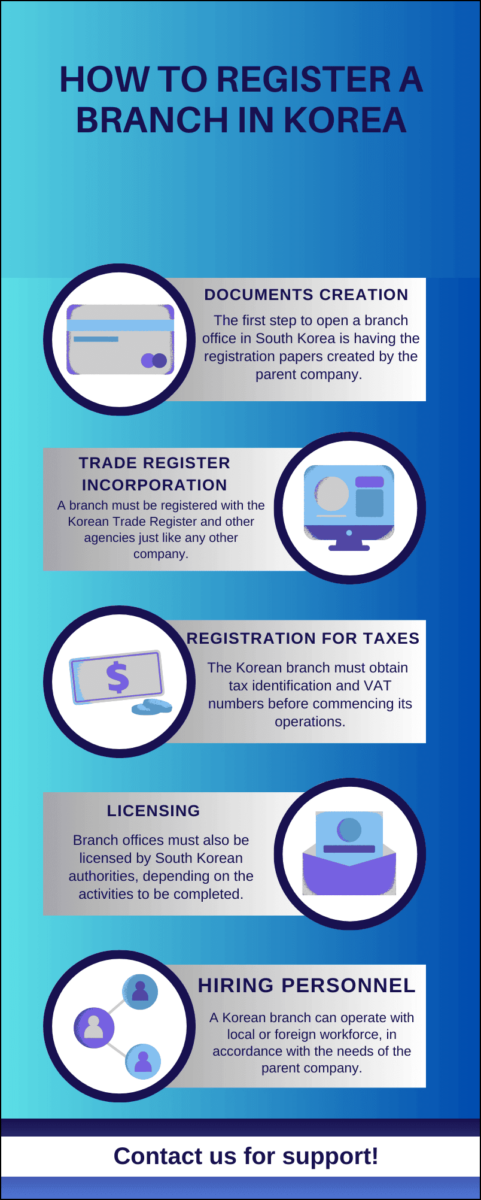The foreign companies who find South Korea an interesting place of investment have the opportunity to open a branch in this country. Two of the main reasons for which investors decide to extend their business activity in this state are the simple company registration procedure as well as the welcoming Korean market. One of our experts in company formation in Korea can explain to you the characteristics of a branch in Korea and they can guide you through the process of establishing one in this country. We can also advise on immigration to Korea.
Table of Contents
Steps to open a branch office in Korea
Foreign companies expanding their activities in South Korea through branch offices must complete 3 steps:
- file a notification on the opening of the branch with the Ministry of Finance and Strategy for certain operations;
- register the branch with the Court Registry;
- file the application for a business number and tax identification number.
If you want to open a company in Korea in the form of a branch in 2024, you can rely on our local specialists who can explain in detail what each step consists of. We also have lawyers who can help with immigration to South Korea.
What are the main characteristics of branch offices in Korea for 2024?
Article 181 of the Commercial Act of Korea regulates several aspects of the formation of branches in this country. According to the Korean legal system, a branch is not considered a separate legal entity. If a foreign company establishes a branch on Korean territory, the branch is considered as well a foreign company.
The profits which are obtained by a Korean branch of an enterprise are only taxed if they were generated in this country. Revenues coming from other markets are going to be taxed in the country where the parent company has its offices or according to the tax agreements in force.
A branch in South Korea does not have autonomy from its parent company, because the branch does not have legal responsibility. The actions of the branch must be therefore approved by the parent company before implementation. Our Korean company formation consultants can give you more details concerning the Korean regulations which affect the establishment and functioning of a branch in this country. Here is also an infographic on this subject:
Our immigration lawyers in South Korea will be your guide in relocation to this country. Once you have spent enough time in Korea to be eligible for the F-5 visa, you can begin the procedure for obtaining permanent residence. Depending on the type of F-5 visa you are applying for and the type of visa you previously held, you will often need to present a set of documents that depend on your situation. Contact our immigration lawyers for support if you plan to apply for residency in South Korea.
How to register a branch in Korea in 2024
Branches in Korea are established through Court Registration with the Supreme Court of Korea. The president of the branch office needs to provide several data and documents regarding the organization and identity of the parent company. Such data include the type of legal structure and the domain of the parent company, its name, and date of establishment, as well as the name and address of the CEO. One of our specialists in company registration in Korea can help you elaborate on the documentation and speed up the formation process in this country.
We can also help you apply for a residence permit in Korea through entrepreneurship. The South Korean investor visa is in fact a cross between the conventional entrepreneur visa, which promotes creatives to relocate to a new country, and the South Korean investor visa, which aims to attract foreign investment.
Filing the notification for the opening of the Korean branch
While in Western countries, the notification may or may not be required, setting up a branch office in Korea implies obtaining authorization from the Ministry of Finance before starting the actual registration for certain types of businesses. Among these:
- banks that want to open branches in Korea;
- companies that deal in securities and insurance;
- companies that cannot obtain their licenses under the Foreign Promotions Law or other laws.
Here are the documents that need to be filed as part of the branch opening notification:
- the application form;
- a certificate of appointment of a company representative who must be a Korean resident;
- information about the parent company;
- the Articles of Association of the mother company;
- the minutes of a foreign company’s board meeting during which the establishment of the branch and appointment of the local representative were settled;
- information on the types of activities the branch will undertake.
In case special licenses are required, the branch representative must also submit information about obtaining them. This may be the case for banks and other financial institutions seeking to enter the Korean market.
It is possible to appoint a proxy to handle the notification and registration procedures. A power of attorney needs to be issued in this sense. You can rely on our Korean company formation officers for representation.
When it comes to foreign citizens, our law firm provides assistance in a variety of legal problems. For instance, you must either find employment, get accepted into a local university, or have family members who already live in this country if you are interested in immigration to Korea. Once you have met the requirements, you can contact our lawyers for relocation support.
What information is the parent company required to file for branch creation in Korea?
A foreign company seeking to establish a branch office in Korea in 2024 must provide specific information that attests to its existence, such as:
- a certificate of existence of the parent company’s head office in the country of origin (such a certificate is usually issued by the Trade Register in the respective country or the Ministry of External Affairs);
- the Articles of Association or other documents that can be used as proof of registration.
Then, for the creation of the branch, the parent company will need to provide a trading name reservation (the name of the Korean office must be the same as the mother company’s), proof of a legal address in South Korea, and details of the local representative.
If you need to have a legal address as soon as possible, you can rely on a virtual office during the early stages of the registration.
You can remain in South Korea permanently if you have a permanent residence permit that is issued based on the F-5 visa. In order to obtain it, however, you must first live here for a specific number of years, based on the reason of immigration to South Korea. If you need support in applying for a residence visa, you can rely on our local lawyers.
We also have a video on how to open a branch:
Taxation of branches in Korea
In Korea, branch offices are taxed as local enterprises. However, if a double tax treaty is in place, the tax paid in Korea may be deducted or exempted in the parent company’s home country.
Korean companies must deal with various accounting requirements, among which keep track of their profits and expenses. These items must be summarized in financial statements like the balance sheet and income statement. At the end of the year, Korean businesses are required to submit financial accounts to the tax office. For this purpose, they are invited to use the services provided by our accountants in South Korea.
Here are the main aspects to consider about the corporate tax in Korea:
- it applies at progressive rates ranging from 10% to 25% based on the income generated by a business;
- branch offices may also be subject to an additional 20% profits tax in certain sectors (the rate may be lower if a double tax agreement is in place);
- the financial year in Korea cannot exceed 12 months, and annual tax returns must be filed within 3 months from the end of the fiscal year;
- branch offices may be granted a one-month extension to this deadline.
One of the most significant economic nations in the world is South Korea, commonly known as the Asian Dragon. Its primary business is targeted toward a regulatory environment that is rapidly changing. Having effective and safe business practices is essential for running a company in South Korea. We provide you with guidance on how to effectively expand swiftly, safely, and economically. Doing business here is a smart move because of the government’s openness to foreign investment, the government’s regulatory effectiveness, and the market’s openness. Post-registration procedures have been eliminated, and regulations are becoming considerably laxer. There has never been a better time to start a business in South Korea as a result of this.
Economic projections for South Korea
In a quarterly outlook report recently released, the Bank of Korea revised its 2023 August prediction of 2.2% growth for the real gross domestic product to 2.1% growth in 2024. The bank’s 2023 growth rate remained at 1.4%. It projects a 2.3% increase in GDP in 2025. In February, the increase for 2024 was first predicted to be 2.4%. The 2.2% estimate from August last year has been reduced to 1.9% growth in private consumption for that year. Compared to the prior estimate of a 0.1% decline, construction investment is expected to decline by 1.8%. The modifications are partially the result of a 5-year, almost 80% spike in South Korean real estate prices, which raised family debt levels.
Feel free to contact our Korea company registration agents for professional help with the establishment of a branch office in this country. You can also rely on our immigration lawyers in Korea for support in moving here.



